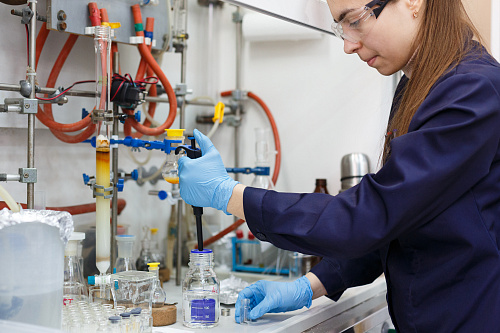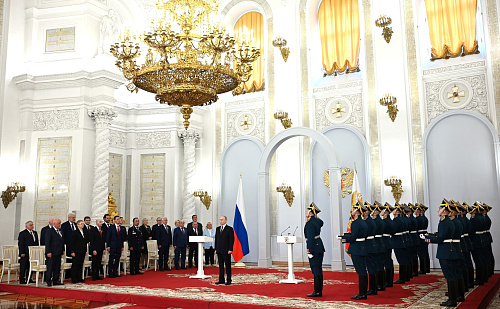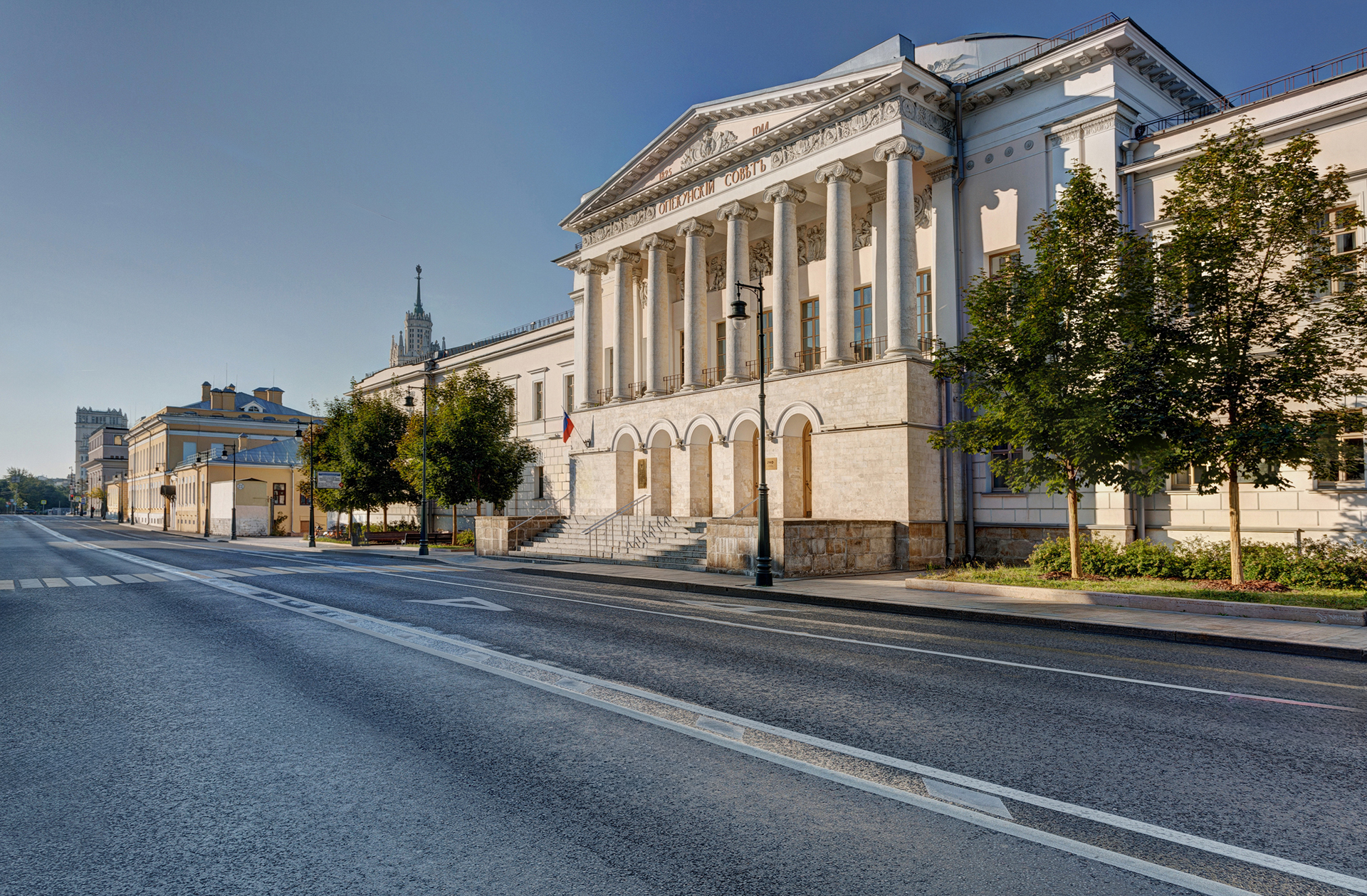
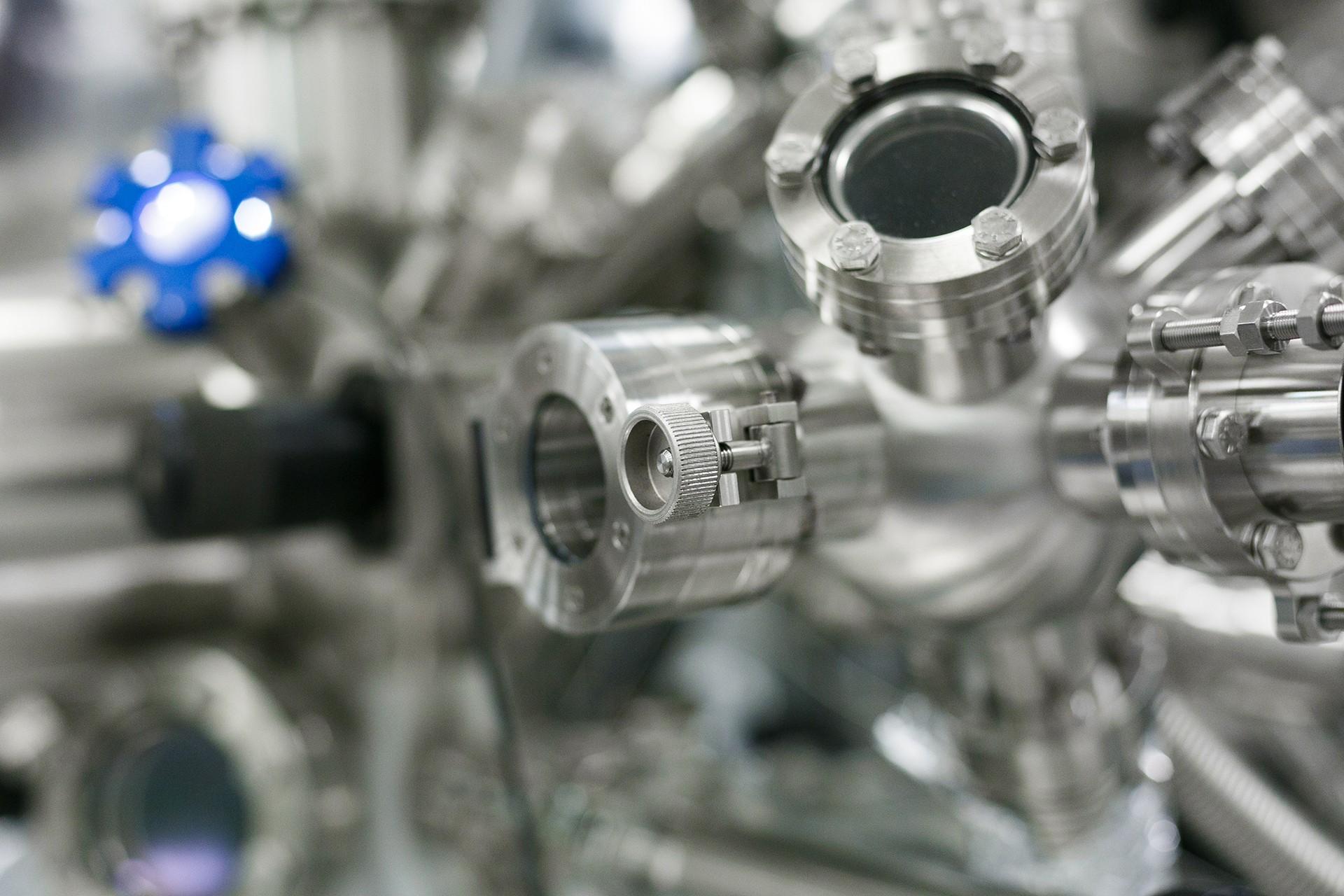
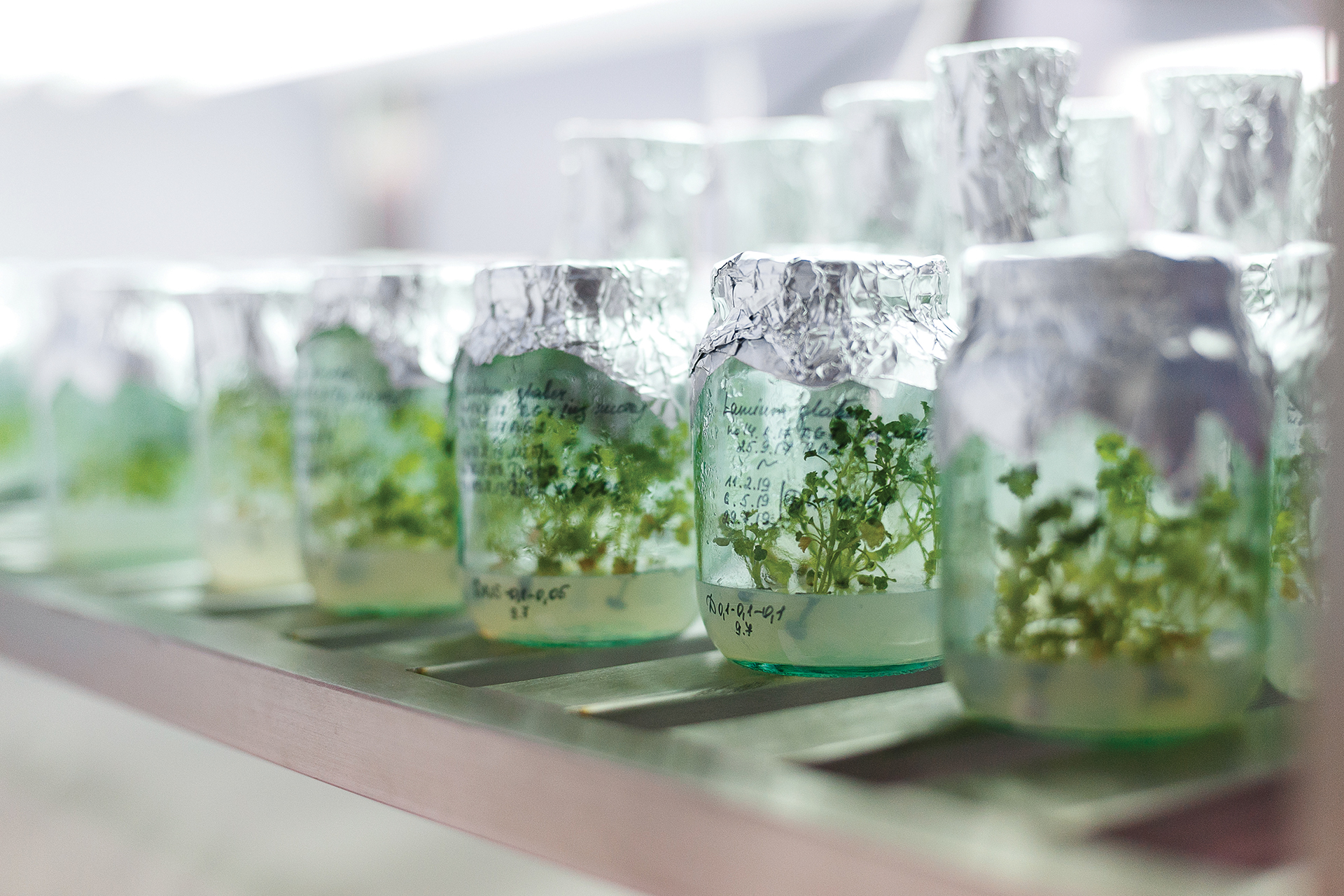
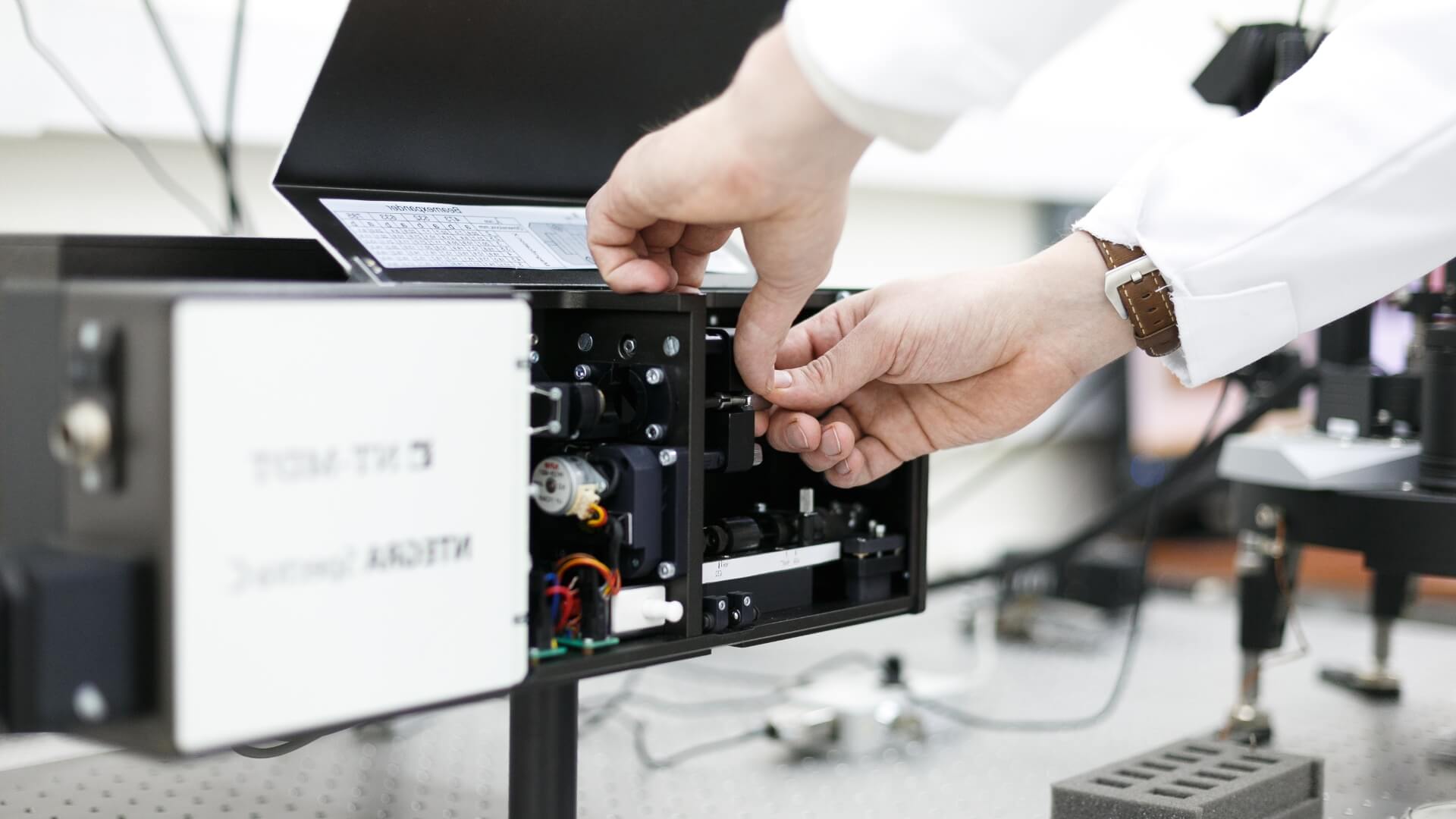
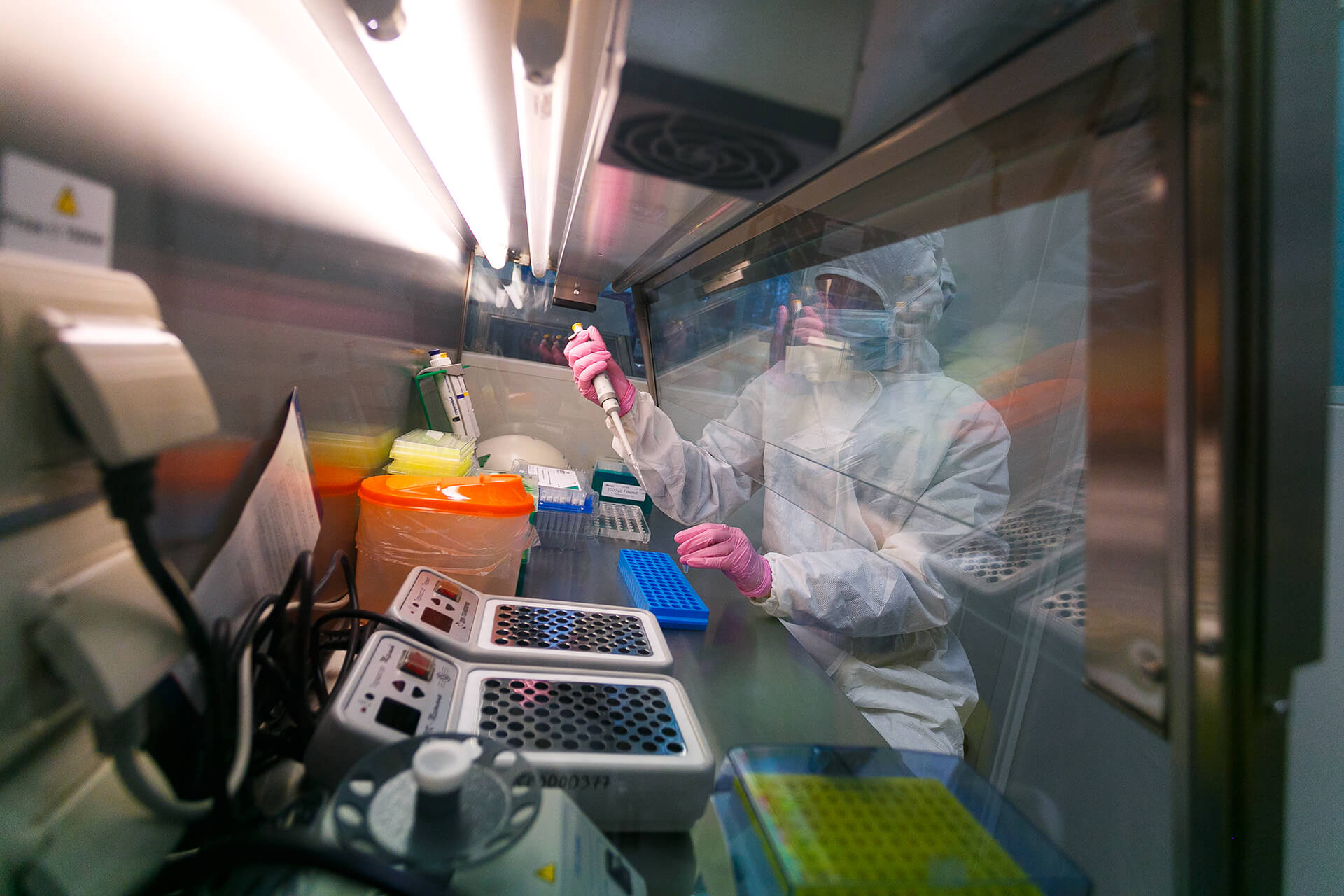
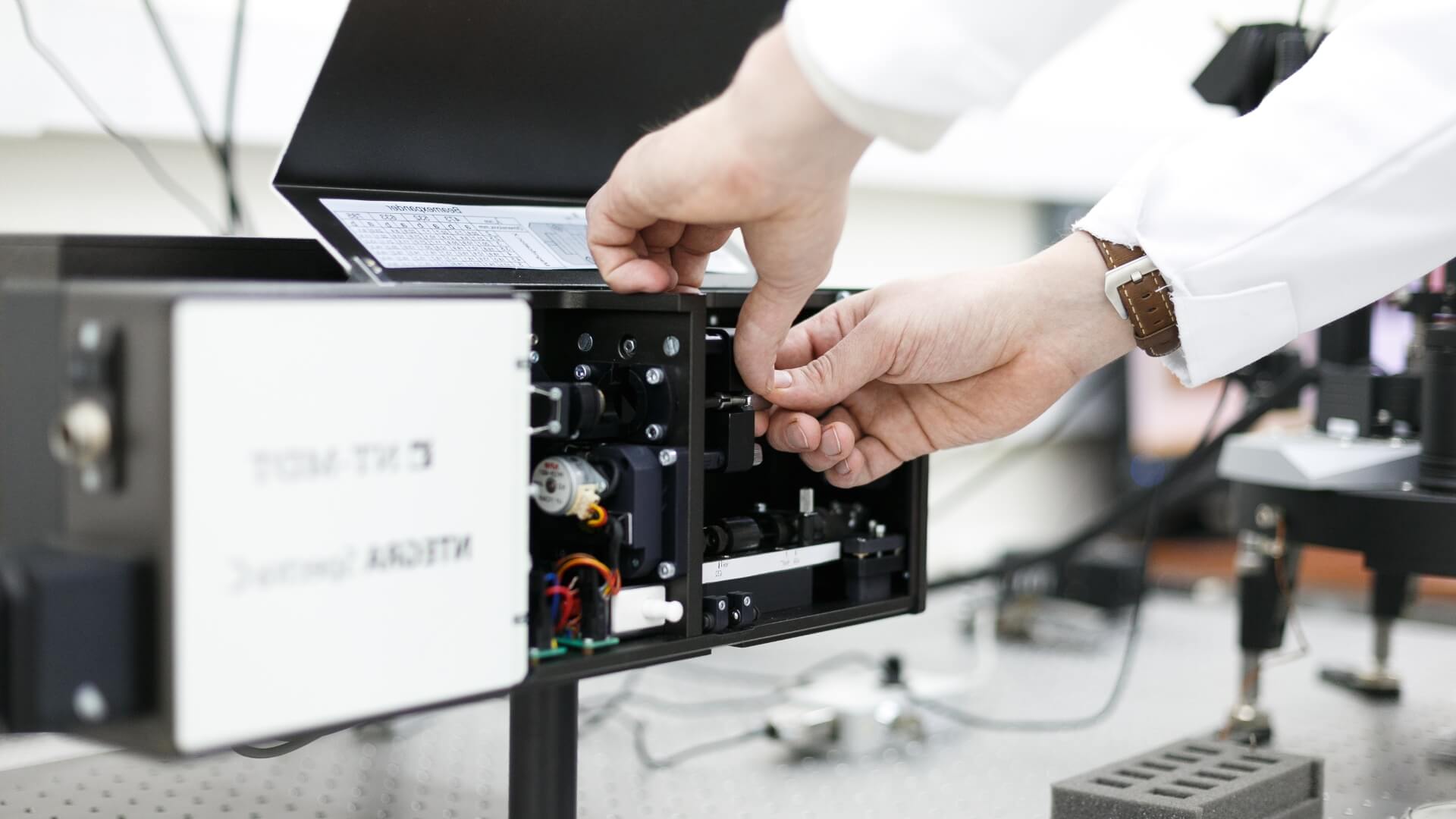
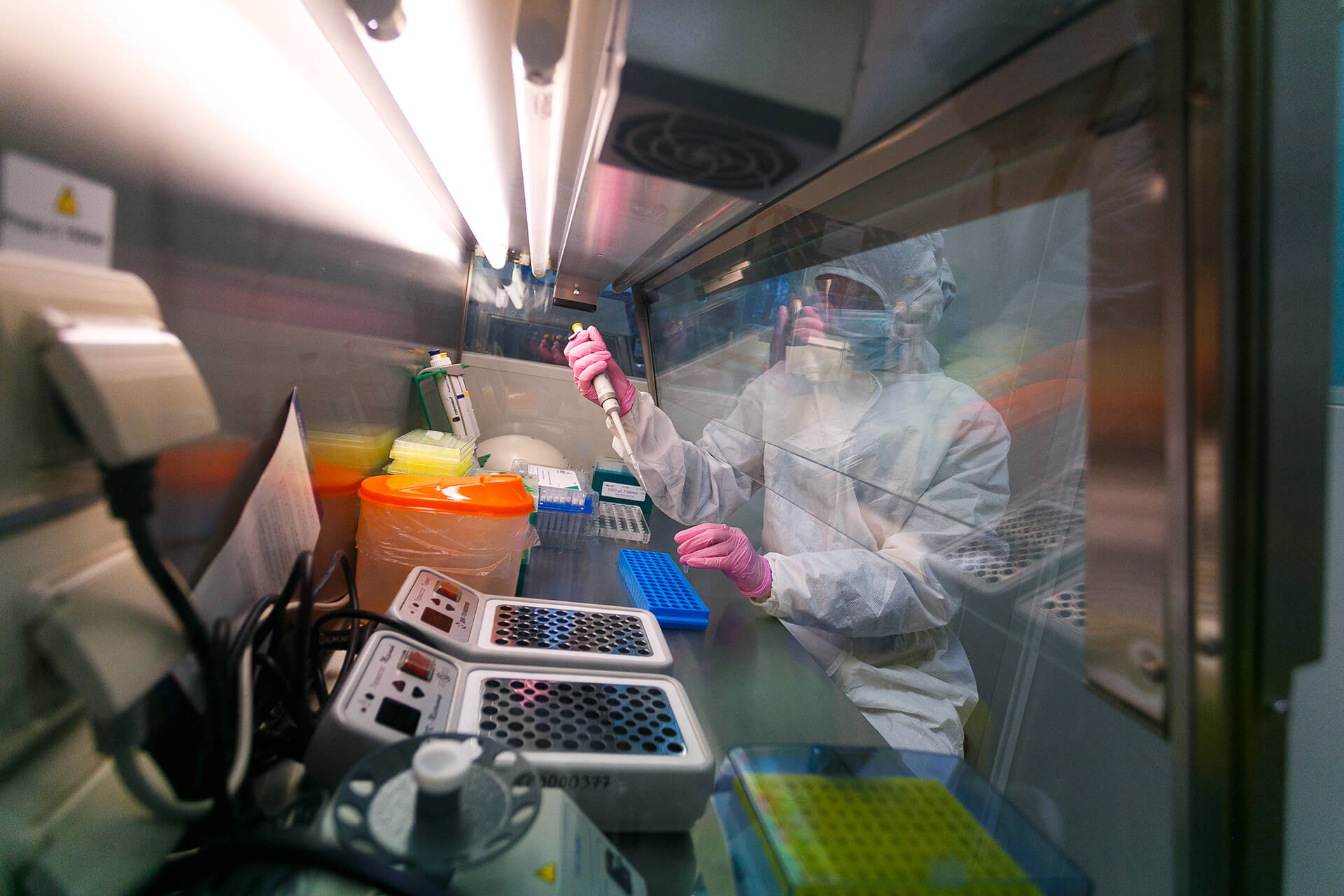
During the meeting, the President ordered the launch of the PIK reactor to full capacity and trial experiments at research stations.
The head of state also said that he had signed an Executive Order on measures to implement the state scientific and technological policy in the field of green development and climate change.
We publish the transcript of the meeting.
* * *
President of Russia Vladimir Putin: Good afternoon, colleagues.
We are not only in different rooms but in different parts of the country as well. I hope the technology is working well, and everyone can see and hear me.
On Russian Science Day, which we are marking today, I would like to invite you to hold a comprehensive discussion on the creation of competitive conditions for Russia’s successful technological development, including the creation of cutting-edge research infrastructure that would allow us to resolve the most complicated and even unique research problems.
Therefore, before we start our work, I would like to give the floor to President of the Kurchatov Institute Mikhail Kovalchuk. He is now in Gatchina, Leningrad Region.
Mr Kovalchuk, I am aware that you are beginning an important and even landmark stage in the implementation of the PIK high-flux research reactor. I remember visiting you at the reactor site in Gatchina, where I observed that everything had been organised in the best possible way. I also remember hearing foreign speech next to the equipment on which you and your colleagues were working.
Can you tell us more about the reactor, please?
President of the Kurchatov Institute National Research Centre Mikhail Kovalchuk: Good afternoon, Mr President, colleagues.
You mentioned the launch of infrastructure, and I would like to note the special significance of the so-called mega-units. These are a highly complex, unique tool allowing the entire scientific community to move in the right direction.
I would like to say that today we are launching a very important unit, while opening Science Day and the Year of Science. In fact, this is the first major Year of Science event. I would like to note that this unit was developed, manufactured, assembled and launched by Russian specialists alone. In this connection, I am very happy that Mr Alexei Likhachev, the CEO of Rosatom, is present here today because we have jointly accomplished this highly complex project.
We are launching a tool which, apart from being a unique unit for conducting absolutely transcendental scientific research, also serves as a basic unit for technological breakthroughs primarily in creating new materials and new technologies for the energy sector, and for developing entirely new medications and biomedical technologies, including nuclear medicine technologies, agriculture and much more.
I would like to say that the existence of such a unit always highlights a country’s technological level. Any state that wants to assert itself as a technological power tries to develop such a unit and to show that it can operate it. Countries that can conceive and develop these units form a very narrow, elite club, and Russia has always occupied a leading and crucial position there.Our leadership is proved by the fact that there are no large-scale global mega-projects where Russia does not hold key positions. For example, first and foremost, the International Thermonuclear Experimental Reactor (ITER), the European X-ray Free Electron Laser in Hamburg, CERN, and the European Synchrotron Radiation Facility where Russia plays a key role.
Moreover, most Western units, including particle accelerators, use physical principles that have been created by Russian scientists. For example, this includes converging particle beams inside colliders, the auto-phasing method and many others.
Today we come back here to launch this unique facility. And I would like to point out that the International Centre for Neutron Research was established following your instructions, Mr President, and many countries in the CIS and outside it have already shown interest. I am pleased to inform you that, firstly, just two days ago, we signed an agreement with our Belarusian colleagues on broad collaboration between the Belarusian Academy of Sciences and the Kurchatov Institute, involving a wide range of scientific problems, and, the plan envisages Belarus’s involvement in the work at the PIK research reactor.
Today, in accordance with your instructions, we will put our first five experimental stations into test trial mode. Two of these five stations have been developed with Germany’s contribution, that is, we created them together with our German colleagues. This is also important and gratifying to note today.Starting the process of putting the PIK reactor into energy mode, we are actually opening a very important year. This year, we plan the physical launch of a world-class facility, a tokamak fusion reactor at the main site of the Kurchatov Institute. We have prepared it for launch, and will soon put it into operation. Next, we have prepared the NICA, which is also moving towards launch, so we have a lot of events coming.
I would like to remind you that tokamak is also a Russian word, just like sputnik, the Russian for satellite, which has become widely used today. A tokamak is a device that was invented in our country, at the Kurchatov Institute, and is now used all over the world.
In conclusion, I would like to say that in fact, today we are celebrating our common success: the success of the academic community in general, the success of Rosatom and, of course, of the Kurchatov Institute. Only thanks to our constructive, consolidated joint activities did we manage to reach the current level.
And finally, I would like to say that none of this would have been possible without the close attention and support of the state, primarily your support, Mr President. You began your remarks by recalling how you had visited here before. Indeed, on April 30, 2013, you also chaired a meeting of the Council here and actually gave the go-ahead and broad state support for the launch of this project.
In this regard, we have made the regulatory and technical preparations for the launch. Now I would like to ask for your permission to give the command to begin the process that will put one of the world's most powerful high-flux PIK reactors into energy operation and start trial experiments at the first five stations.
Vladimir Putin: I see and you have said yourself that Mr Likhachev is next to you. I am very pleased that you are not annoying one another today and do not think that something has been stolen on the sly from you. (Laughter.)
Yes, I said this for a reason because this is what we will speak about today. We have certain problems in pooling efforts for the final result instead of pulling things apart to respective ‘little nooks’, although your ‘nook’ is certainly not little, this is obvious.
But before starting this work I would still like to address Mr Likhachev. Mr Likhachev, would you like to add anything?
Director General of the State Atomic Energy Corporation Rosatom Alexei Likhachev: Mr President, of course, I would like to add something.
First of all, I would like to congratulate everyone on both the Year of Science and the Day of Science and to say that we have launched a unique project here. On the one hand, we seemed to have used our usual technology linked with the launching of an energy facility (the Leningrad Atomic Power Station is next door). On the other hand, it was still a different project. Considering the absolute priority of security and the absolute priority of Russian technology, we still mastered new knowledge and skills during its implementation. Both Atomtekhenergo and Atomenergo have taken steps that will allow us to reach an international level in the development not only of energy facilities but also research units as well. This is my first point.
And my second point. Mr Kovalchuk has already mentioned the international aspect. We are carrying out the PIK project. We are also working in the Dubna Joint Institute of Nuclear Research. In Dimitrovgrad, we are implementing the multipurpose fast-neutron research reactor project (MBIR). With the account of these facilities, we will actually meet the global demand for neutron research by the middle of the 2020s. This is important for both fundamental science and the development of atomic power engineering, the transition to the fourth generation already.
Needless to say, we always have some kind of competition between people or ideas. This is quite normal. But we have created an alliance and the Russian Academy of Sciences (Mr Alexander Sergeyev is present at our conversation) is an absolutely fully-fledged member of this alliance. We have joint development programmes, both practical ones, for instance, those linked to the Bolshoi Sarov, and fundamental ones related to research programmes planned literally for decades ahead.
So, I can just join this mood of so much achieved and still more to be done. In turn, I would like to thank Mr Kovalchuk for his true partnership and very mutually attractive cooperation.
Vladimir Putin: Mr Kovalchuk, please put the PIK reactor into energy mode and start the test experiment.
Mikhail Kovalchuk: We have even made a commemorative golden key, which I am presenting to the shift on duty. Please start the process of putting the reactor into energy mode. You will now see on the screen how the power will grow.
Go ahead, please.
Engineer: Control Engineer, please start increasing the power.
Engineer: Confirmed. I am starting to increase the power now.
Engineer: The numbers are going up.
Mikhail Kovalchuk: You can see it on the screen, the numbers are going up, the curtains are opening, the active zone, most of it is starting to open slowly, and we can see an increase in intensity, and the power is going up.
I would like to report, Mr President, that the reactor is now close to regular operation. This has been a long and complicated process, but we have successfully overcome this stage. And it is our joint achievement.
Vladimir Putin: I see.
Mr Kovalchuk, dear colleagues,
I am speaking to everyone, to your entire team. I wish you all successful and fruitful work. Once again, wishing you all the best on Russian Science Day, and of course, I invite you and your colleagues to take part in the Council meeting.
The Kurchatov Institute has solid traditions and specialists with an unprecedentedly high level of qualifications. You have surprised us, our country, more than once with your discoveries. I am confident that this step forward will benefit our great country.
Thank you very much. Good luck.
Mikhail Kovalchuk: Thank you.
Vladimir Putin: Colleagues,
Mr Kovalchuk has just mentioned the attention the Government is paying to strengthening our country’s scientific potential. Indeed, this is long-term and systematic work. It has been going on consistently over the recent years. I am referring to the development of an advanced research infrastructure of universities and research centres, a support system for young talents and the involvement of our compatriots in scientific projects.
Time has shown that we have been doing the right thing, and timely too. Education and science, and Russia’s technological sovereignty, have become not only important, but to a large extent decisive, key factors in national security and the quality of life today.
And it is no coincidence that all the leading countries consider science as one of their strategic priorities. The dynamics of global change are growing before our very eyes. The pandemic is not only a test for humanity; it has also accelerated the widespread introduction of advanced solutions in all spheres of life.
Our policies in scientific research and technology and steps designed to support national scientific research must meet the challenges of a whole new level of complexity. Our goal extends beyond gaining new knowledge and making breakthrough discoveries. Importantly, technological progress must serve the people and be widely available.
Here is a case in point. Thanks to our researchers, Russia enjoys a leading position internationally (I am not saying anything unusual or new, we are all well aware of this) in terms of creating a vaccine against the coronavirus. Moreover, we are the only country with three vaccines of our own design. This is, without a doubt, a major success. But even more significant is the fact that we were able to build on it, to launch vaccine production and to start widespread vaccination. Thus, the joint efforts of researchers, domestic companies and the state allowed the people in our country and in other countries across the world to benefit from this scientific breakthrough.
Importantly, we need to apply similar efforts to achieve fast implementation and scaling of technologies and then use them to create competitive products in other areas that are critical for society and every individual. We are talking about accelerated digitalisation, solutions designed to protect the environment and to produce high-quality food, innovative environmentally friendly energy sources and state-of-the-art medical technology. Four years ago, we included these critical areas in the Strategy for the Scientific and Technological Development of Russia.
Ambitious research and technology programmes have been launched in agriculture and genetics, which are the areas where research can significantly improve the quality of life and life expectancy, and improve the health of the nation.
I propose discussing the implementation of these complex programmes during a series of special meetings to be held soon. Importantly, they have already made it possible to combine the capabilities of universities, research organisations, private businesses and companies with state participation, so that we can now quickly create and introduce innovative technology solutions.
In this regard, I believe we must use this approach in yet another sphere that is critical for society. I have just signed an executive order on launching a federal research and technology programme focusing on environmental protection and climate. The point is to develop and implement, in conjunction with businesses and the scientific community, domestic technological solutions that will ensure environmental safety, improve the environment, and make an effective contribution to overcoming the challenges posed by climate change.
Dear colleagues,
I consider an increase in the public authority, the recognition of the importance of research and the growing prestige of researchers among the younger generation a substantial integral result of our efforts to develop science.
I will quote some interesting figures now: according to sociological polls, almost two thirds of parents support their children’s decision to pursue science. Indicatively, since 2016, the number of such families has almost doubled. As for young people themselves, every tenth is ready to choose a scientific career. In terms of human resources, Russian science is really becoming one of the world’s youngest. Quite recently, we were concerned that it was getting old. The situation is changing and our young people are achieving important results in medicine, genetics, quantum physics and other promising areas.
Today, young scientists, winners of the 2020 State Prize in Science, are taking part in the session of our council. Experts describe their discoveries as a true scientific breakthrough. I will describe these works, these achievements with great pleasure and pride, as far as our format permits it today.
Vladimir Maximenko was the first to explain many complicated cognitive thinking processes, which made it possible to create new systems for monitoring the activity of the brain, as well as methods of early detection of serious neurological diseases and relevant rehabilitation.
A research team – Yevgeniya Dolgova, Yekaterina Potter and Anastasia Proskurina – have developed innovative medications and methods for treating oncological diseases. In effect, they have created a universal platform for the effective individual application of a wide spectrum of anti-tumour agents and technology.
Owing to a genuine breakthrough in microbiology and genetics, Kirill Antonets and Anton Nizhnikov have brought science very close to the development of effective methods for treating serious hereditary diseases.
The innovation by the team headed by Yevgeny Khaidukov paves the way to the development of new materials in industry and biomedicine. In particular, it makes it possible to replace damaged tissues with various polymers.
Dear friends,
I would like to sincerely congratulate all of you. Your example and the work of your colleagues show that we have a powerful human resources potential for the development of new, promising areas of science and for continuing the best traditions of the great scientific schools that were created even before the revolution, as well as in Soviet times.
To show our respect for all generations of domestic researchers, our trailblazers, we have proclaimed 2021 the Year of Science and Technology.
I am hoping the council members will take an active part in the events of this year, which should be aimed not only at promoting science. It is also important to conduct a large-scale education campaign to enable Russian citizens to know more about the daily work and achievements of our scientists and their tangible contribution to our national development. This is very important. I have already recalled Daniil Granin who told me that we say very little about science and the achievements of our researchers.
Let us move on to our agenda.
Let me give floor the head of the Russian Science Foundation, Alexander Vitalievich Khlunov. Please, Alexander Vitalievich.
Alexander Khlunov: Dear Vladimir Vladimirovich! Dear colleagues!
The strategy of scientific and technological development has determined the main goals, objectives, principles, priorities, directions and measures for the implementation of the state policy of the Russian Federation in this area. Its implementation is a prerequisite for achieving national development goals.
Overall, since 2010, federal budget allocations for civil science have increased by 7.6 percent in constant prices, including for basic research - and this is very important - increased by 22.5 percent.
The federal scientific and technical programs you mentioned, Vladimir Vladimirovich, made it possible to focus the best research teams on solving problems significant for the country and to direct efforts to ensure the transition of results in agriculture, genetic technologies, basic research, to the creation of new technologies and their further use for production products and services.
There has been a significant development of competitive funding for research carried out mainly through the system of research support foundations. The financial support for research funding foundations has increased in 2020 in comparison with 2012 by 4.6 times. For a large number of scientists, conditions have been created for working on research projects comparable to those that exist in leading research nations.
A network of unique research infrastructures is being developed in Russia. Today, the power start-up of the PIK neutron radiation reactor in the city of Gatchina was carried out, last year the first stage of the NICA accelerator complex in the city of Dubna, construction of the SKIF synchrotron radiation source of the Koltsovo science city began.
The measures taken made it possible to strengthen the human capital for science, reduce the outflow of research personnel abroad, and ensured a steady increase in the share of young researchers under the age of 39 in the total number of researchers. The technical research equipment per researcher in 2019 increased by 2.2 times compared to 2010.
The research community is in demand for directions of work on the priorities of the Strategy. At the same time, in recent years, there is a continued decline in the relative contribution of non-state funding for research. State funds now account for 66.3 percent of the total domestic spending on research and development. At present, an increase in the budgetary provision of the sphere of research does not lead to an increase in funding for research, but only replaces the money of the private sector in it. Scientific and technical developments of our scientists do not find their way into the production, effective management mechanisms have not been created for the implementation of scientific results in the production of goods and services. There are exceptions here.
Last year, despite the economic difficulties amid a pandemic, with the use of large-scale state support, it was possible to concentrate financial resources by combining the potential of scientific and technological developers and the production complex, and as soon as possible to ensure the creation and registration of Sputnik V vaccines in the Russian Federation (Gamaleya Center ), EpiVacCorona (Vector Center), KoviVak (Chumakov Center) and biomedical cell products in response to COVID. This is a major change for Russia in the global pharmaceutical and biotechnology market, but it also brings new opportunities. And today it has become especially clear that we need to have our own production of basic pharmaceutical substances of biotechnological orientation. It is necessary to have our own production of bioreactors, to train highly qualified specialists to work on this high-tech equipment. This will ensure the protection of the vital interests of our citizens in the preservation and maintenance of health in the context of the sanctions policy against Russia in this critical area for our country.
Another example is the development on the basis of domestic scientific developments of environmentally friendly and resource-saving energy, including hydrogen energy, the formation of new sources, methods of transportation and storage of energy, the creation of new environmentally friendly sources and storage of electricity for enterprises, transport and households, including smart grids and distributed power plants. The implementation of these measures will give an advantage that every citizen of the country can feel, for example through a reduction in tariffs for energy carriers, an increase in the reliability of energy supply, a decrease in the number of accidents in networks, and an easier conditions for connecting consumers to the networks.
Another example is ensuring the ecology of the environment. When assessing the importance of this area, it is necessary to take into account the "green policy" adopted by the European Union, which provides for the closure of foreign markets for the export of goods from countries that do not comply with its environmental requirements. Continuous remote monitoring of the carbon footprint is intended to become the main tool for influencing the world economy and agriculture in terms of transition to the decarbonization regime.
It is necessary to deploy our own carbon monitoring system, which will protect Russian manufacturers from biased actions by our foreign partners and the use of prohibitive measures in relation to products manufactured in Russia. Moreover, this will make it possible to take prompt and effective measures to improve living conditions for citizens in settlements, next to which there is currently a large industrial production with significant carbon emissions.
Another area is the complex of problems of the older generation. In Russia this year the share of people over working age in the total population of the country will reach 26.4 percent, which is 39 million people. By 2030, this will already be 27.5 percent, it will already be 40.5 million people. Population aging is one of the important factors affecting social, economic and labor market policies. The active use of the potential of all generations, especially the growing number of the older generation, is becoming critical. It is necessary to adapt social and medical services to the preservation of an active life by the older generation and the development of social technologies to ensure proper care through coordinated targeted efforts of the whole society to improve the quality of life of the older generation. The possibilities of increasing the physiological capability of human life and healthy longevity can only be realized if the achievements of new technologies are used on the basis of advanced research, this is the development of human potential that we need.
The above examples testify to the main thing: we need greater coordination of efforts of business and researchers with comprehensive support from the state in a limited number of priority areas with the goal of improving the quality of human life. Effective implementation of priority projects will require the use of an appropriate set of tools. The first group of tools is aimed at creating conditions for manufacturing companies. This is the widespread use of government subsidies that provide support to manufacturing companies involved in the implementation of research projects, this is the introduction of incentives for reimbursing organizations in the real sector of the economy up to 50 percent of the costs of R&D, subject to the commercialization of the results obtained during their implementation. Such a mechanism has already been launched by the Government since 2010 and has shown its effectiveness within the framework of the implementation of Government Decree No. 218. It combines the efforts of scientific and educational institutions with specific plans for the development of the real sector of the economy. Financial support for capital-intensive R&D by reducing the tax burden on selected projects, calculating tax benefits depending on revenue indicators, from the sale of high-tech products created on the basis of R&D results; activation of the mechanism of special investment contracts providing for the creation, modernization and development of industrial production in the territory of the Russian Federation; use of the project financing mechanism with the participation of VEB and partner banks for the implementation of complex projects; transfer to manufacturing companies of exclusive rights to the intellectual property created in the course of research on the basis of patents obtained, not encumbered by additional obligations to the Russian Federation to provide third parties at the request of the state customer with a free simple license.
The second group of tools is aimed at improving the activities of research performing and technology developing organizations. As a qualified customer of applied R&D, along with government customers, we should provide for the broader participation of manufacturing companies, attract manufacturing companies as a qualified customer and when forming a government assignment, when conducting research, scientific and educational institutions that are accountable to our ministries and departments, use the experience work of councils on priority directions of scientific and technological development of our country, created within the framework of the Strategy, significantly expanding the participation of representatives of research developers in their composition. We should ensure an increase in the role of independent scientific and technical review, normatively fixing the definition, uniform criteria, approaches and mechanisms for the examination and assessment of the obtained scientific and technical results.
The above two groups of tools are - to one degree or another - already used by the ministries to support scientific and technical projects, but their application is not systemic and is fragmented. Moreover, it seems necessary to note one more aspect: the model of economic transformation implemented in the 90s of the last century led to the practical destruction of applied science and the degradation of high-tech industries. Therefore, active coordination on the part of the state of this process using the third group of tools is required.
The third group of tools is aimed at forming a critical block of management for complex projects, first of all, this is the definition of a common coordinating body, possibly a commission, for selected projects. The decisions of this body should be binding for the federal executive bodies and organizations involved in the implementation of the project. For each project, the responsible project-lead should be determined, organizations responsible for the development of technologies and for the production part should be identified; focusing the management mechanism on bringing the results of research and development to practical use by organizations in economy; normative consolidation and launch of a mechanism for multi-channel funding of projects on the principle of a full innovation cycle at the expense of business funds, development institutions and budgetary allocations for research and development for civil purposes.
Dear Vladimir Vladimirovich! Dear colleagues!
The implementation of priority projects will allow to work out with the possibility of subsequent replication the mechanisms of interaction between the public sector of research and private business, increase the real interest of both large companies with state participation and private business in co-funding research and development and to ensure an increase in the efficiency of management of the scientific and technological sphere as a tool achieving national development goals based on advanced scientific and technological results.
Ultimately, this will lead to an increase in the standard of living of citizens, the creation of comfortable conditions for their living. In this case, the role of science in the development of the country will not only be understood by every citizen, but also will be supported by the whole society.
Thank you for attention.
Vladimir Putin: Thank you. I marked some of your points for myself, then I will definitely come back to your proposals.
<…>
Vladimir Putin: I would like to thank all of you, colleagues, for the detailed, open discussion and your proposals.
Let me repeat, the competitiveness of the national economy and domestic companies depends on the level of technological and scientific development. Daily life, the wellbeing of every person and of course Russia’s security are directly linked to it.
We are seeing that global competition for technology and knowledge is rapidly gaining momentum all over the world. I said this in the beginning. In effect, there is nothing new in this statement. It is perfectly obvious that the country that gets ahead will determine the further development of all of humanity. Therefore, it is no exaggeration to say that scientific and technological sovereignty is a matter of Russia’s present and future.
We have everything we need to be in the lead in science, primarily, talented young people and strong scientific schools.
We must build up this potential. And we must not depreciate it, but unfortunately, this is the result of disunity, weak and limited communications between ministries, agencies and research centres that are supposed to work for a common goal in technological development.
When Mr Kovalchuk was launching the PIK, I started talking about this for a reason. In fact, our colleagues confirmed this during today’s discussion.
This explains the duplication and dissipation of funds that the state allocates for science, as well as the lack of motivation and reasonable, at least, expected results.
To move forward in the future, we must certainly leave behind this interdepartmental strife. We must act as a united front and pool our efforts. Only in this way can we carry out major innovation projects of national significance, which directly influence the life of every family and every citizen of Russia.
These projects include the development and large-scale production of advanced domestic equipment, including medical devices and materials for new medications, as well as the introduction of the domestic climate-monitoring technology that we also mentioned today.
I know that in the civilian sector, just as in the defence industry, we can manage to achieve equally important results by creating technology that nobody in the world has. We must consider the experience of organising very sophisticated technological projects in the defence industry.
In this context, I will mention specific decisions that may be implemented in the near future. We have spoken about them today. What I will say next is based on your proposals, colleagues.
First. I am asking my colleagues from the Executive Office jointly with the Government to prepare and submit for signature an Executive Order changing the governance mechanisms for state science and technology policy.
I will explain. Following up on your proposals, I also propose significantly changing the format of work and principles of membership in the Council for Science and Education, to include members of the Government and the Security Council. It has to do with some of our research projects being classified as secret, or top secret, and sometimes even as highly sensitive information. This is why we need to put together a team that will have authorized access to any projects, and thereby significantly strengthen the strategic decision-making mechanism for science and technology.
I also consider it necessary to set up a special government commission for science and technology development; this proposal was just made here. It should include personally responsible representatives from ministries at a level not lower than deputy minister, as well as representatives of the Security Council.
I hope this will improve the efficacy of operational management and interdepartmental coordination in making and implementing decisions on Russia’s science and technology policy.
Further on, I am asking the Government to prepare and adopt a new state programme for scientific and technological development. At the same time, we need to change our approaches to financing science from the state budget. This means ensuring the general planning and implementation of R&D projects, adopting uniform criteria for evaluating their results and conducting scientific and technical appraisal.
In addition, we need to create more effective incentives for private companies to participate in applied research together with state research institutes, universities and design bureaus, and to use Russian solutions to modernise production facilities and manufacture high-tech products. Everything that has been said during our discussion today is important.
And in conclusion, I would like to once again wish you all the best on Russian Science Day, all Russian scientists and our compatriots, engineers, students and schoolchildren, and all citizens of our country. It is our common holiday, in the full sense of the word, and again, we can only attain the goals of technological development together, by uniting our efforts.
And finally, one of our colleagues has a double holiday today. It is also his birthday. Let us congratulate the President of St Petersburg State University, Nikolai Kropachev, on his birthday. All the best. Happy birthday!
Nikolai Kropachev: Mr President, it is our joint holiday today – it is the birthday of our university.
Vladimir Putin: Wonderful. This means I also have a double holiday.
All the best to you!
Thank you all very much. Goodbye.
